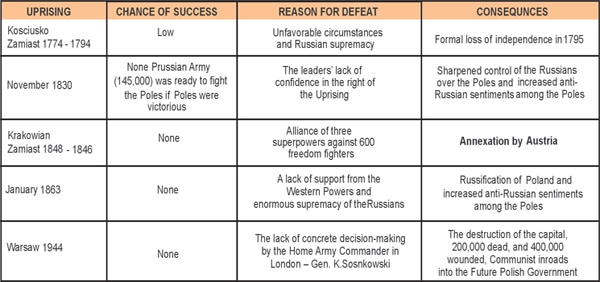
Introduction
The 60th anniversary of the 1944 Warsaw Uprising invites dialog between the Bridge Generation (to which I belong), the Fathers’ Generation and the
For obvious reasons, these generations defend their own stance on the Uprising. As a child of the War, and on behalf of all victims of this Uprising, I would like to offer my own opinion that the Uprising was unnecessary. During the 50th anniversary of the 1944 Uprising, I provoked a discussion on this issue in the Polish-American press. I was told then that until the participants of the Uprising are no longer alive, there can be no rational discussion on this topic.Perhaps this anniversary is the last chance for a dialog with the living participants of the Uprising, who as a result of learning the views of successive Poles, may change their own opinions regarding the validity of their actions.
The purpose of this dialog is twofold: a search for truth, as well as formulating first principles that may act as precedent for similar crises in the future. The goals of this dialogue do not extend to the condemnation of Uprising participants, who martyred themselves for the good of
As a scholar, I am interested in finding and teaching the truth, and against the manipulation of history to serve competing agendas. Just as the Americans set up a Commission to investigate the facts and decisions which led up to the attacks on September 11, and just as South Africa set up a Truth and Reconciliation Commission to examine the crimes of Apartheid, Poland should analyze the decisions and facts regarding the Uprising in the same light. The search for truth in these cases was not always so easy. The communist Poland PRL: (1952-1989), in an effort to move forward from a sad past, overtly censored the facts and decisions of the Uprising. As well, self-censorship among Polish Émigrés was encouraged, so as not to provide ammunition to the ruling Communists.
Table 1. Polish Uprisings

The fallout of the Uprising can be felt today by observing the low quality of political discourse among current Polish decision-makers. There is simply a lack of older intellectuals, who were direct casualties of the Uprising. The 1944 Uprising was not the first uprising to decapitate the intellectual capacity of
One can estimate that in various Polish uprisings about half a million citizens were killed and 2-3 million persons were wounded. Nowadays, about 15 million people of Polish origin live outside of
There exists a theory that the syndrome of Polish Uprisings contributes strongly to the level of Polish patriotism throughout history. Patriotism fueled the Polish drive for independence in 1918 (after 123 years of being in captivity), and in 1989 when communism collapsed in
It is worth mentioning that Polish history examined from abroad evaluates
History forgets that 16th century
